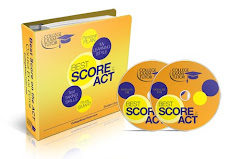 |
| Start Early and Work Smart! |
When to Start Thinking About the ACT Although the ACT is a test for high school juniors, wise students begin to prepare for it in their sophomore year. Currently ten different states administer a test called the PLAN test to sophomores. This is a type of 'mini-ACT' and gives students a report on how well they can expect to do the following year when they take the ACT. It accounts for the fact that there are some subject areas where sophomores are still not proficient, but should be by the time they take the ACT in their junior year. However, the PLAN test is not your only option for an early indicator on how well you can expect to do on the ACT.
Taking Your First ACT Test
If your school does not offer this test, you can still obtain an official ACT practice test from your guidance counselor or download one from the ACT website free of charge. Taking the time on afternoon to take the test, with someone watching the clock, is a wise idea.
All practice tests are not equal, however. Ensure that you have either an official ACT practice test, or one that breaks the Math and English scores down into subscores. This is not the norm with practice tests you buy in ACT study guides at a bookstore, though some do have the subscore breakdown.
Understanding Your ACT Score Report
Whether you get an official score report from an actual ACT test or just score a practice test yourself, analyzing the results will provide you with some very valuable information. You will see in which areas you are strong and in which areas you need to focus some studying. "Just study everything" is a very ineffective plan, and your score report / score results will prevent you from wasting valuable study time in areas that did not negatively affect your score.
Time is on Your Side as a Sophomore!
By beginning in your sophomore year, you can accomplish a lot of preparation with just 5 minutes each day. Subscribe to an ACT mailing list, like the one at http://collegeexamtutor.com/ in order to get weekly or daily practice questions. By breaking it down into bite sized chunks, you can be very prepared and confident when test day comes around.
Now that you know what to do, go to http://www.collegeexamtutor.com/ to get free weekly tips and practice questions for the ACT!

